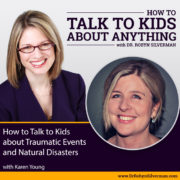How to Talk to Kids about Traumatic Events and Natural Disasters with Karen Young
School shootings, traumatic weather events, local fires and acts of terror– When the world is struck with a catastrophic event, it is natural to want to shield our children from the effects of it. We want to keep their innocence in tact- allowing them to grow up carefree and unfettered—feeling safe and calm wherever they go. We might wonder, if we just don’t talk about it- could our children remain in their happy little bubble for the time being?
The problem is—we live in a world where children receive messages about traumatic events from many different avenues- it’s not just the news that we can easily turn off—or even the 24/7 access to the internet that provides a play by play as negative stories develop. It’s also that different families have different rules about such access- with multiple kids of various ages in their homes who are permitted to have more access- so that might mean you send your blithely innocent child to school, ignorant of the scary events that might have occurred, only to have them bombarded with the news from a more informed (perhaps not accurately so) child on the bus—or from a group of kids in class.
Knowing that something has happened but not having anyone to explain it in age-appropriate terms and how it relates to our specific children can be frightening to anyone. We all need context, assurance and our own concerns addressed by someone we trust—our kids actually need information to feel safe and– as a parent or educator who knows the child, you are the perfect person to have this conversation with them. I’ve talked about this on national TV shows and in written press but I thought it was important to talk about it on my podcast—especially through the lens of anxiety as many kids have trouble dealing with such large-scale events.
My next guest tells us that since you know your child best, “it’s important to manage the conversation (Or, shall we say, tailor it) based on who they are, what they already know, and what it means for them.”
Karen Young has been on our podcast before- talking about anxiety. In fact, her podcast episode is in the top 5 most downloaded episodes of How to Talk to Kids about Anything, of all time. She is back today to discuss with me how we can talk to kids about traumatic world events. Karen has worked as a psychologist in private practice and in educational settings. She founded the popular website, Hey Sigmund, which attracts millions of readers each year. Karen is a sought-after speaker, both at home in Australia and internationally. She is the author of ‘Hey Warrior’, a book for kids to help them understand anxiety and find their ‘brave’. The book has now been translated into a number of languages.




 involved in sports, we also want them to stay on top of their academics, spend time with friends and family, relax and engage in other activities that they love. But our children can’t do everything. Some options to think about are (1) Limit the number of competitive sports to one (or maybe two if they are seasonal) per year, (2) Consider recreational sports instead of competitive ones or do a combination of each, (3) Schedule in breaks during the week or during the year when the pressure is off and the children can just be children.
involved in sports, we also want them to stay on top of their academics, spend time with friends and family, relax and engage in other activities that they love. But our children can’t do everything. Some options to think about are (1) Limit the number of competitive sports to one (or maybe two if they are seasonal) per year, (2) Consider recreational sports instead of competitive ones or do a combination of each, (3) Schedule in breaks during the week or during the year when the pressure is off and the children can just be children.